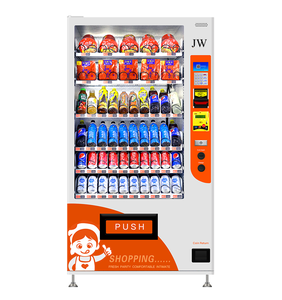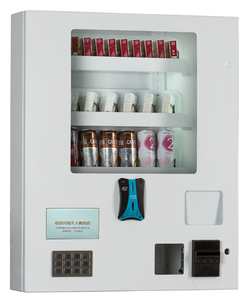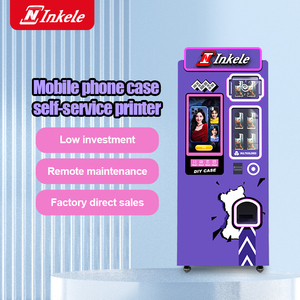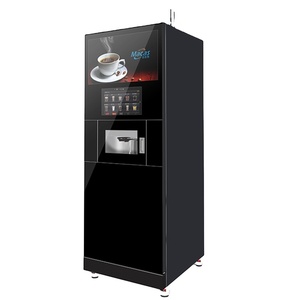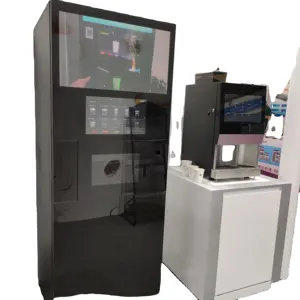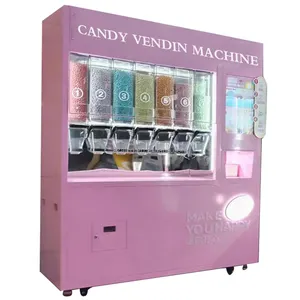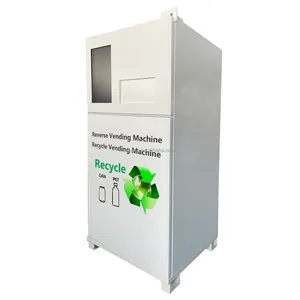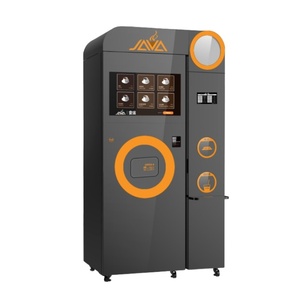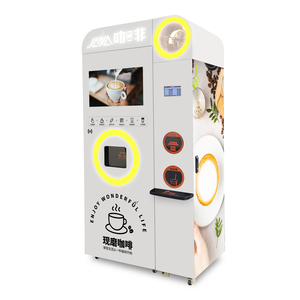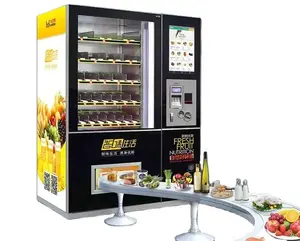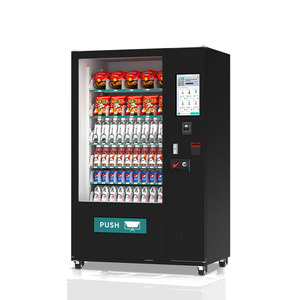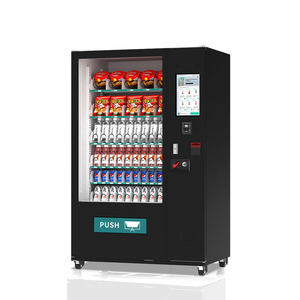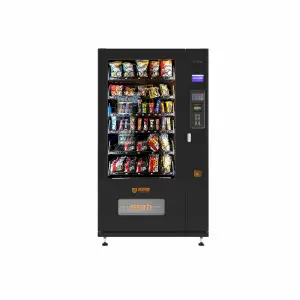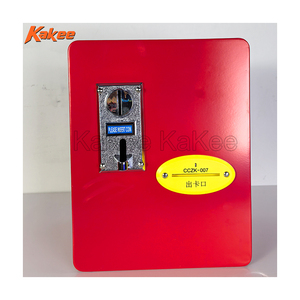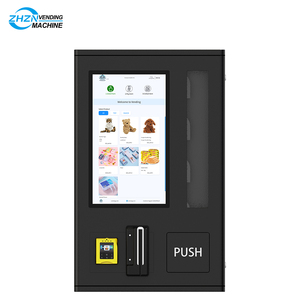Automated Key Copying Vending Machine Manufacturer





































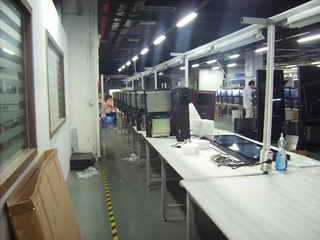





































About automated key copying vending machine manufacturer
Where to Find Automated Key Copying Vending Machine Manufacturers?
China remains the global hub for automated vending machine manufacturing, with specialized production clusters in Guangdong and Shandong provinces. These regions host vertically integrated supply chains capable of delivering complex electromechanical systems like automated key copying vending machines. Guangzhou-based suppliers leverage proximity to electronics component hubs in the Pearl River Delta, enabling rapid sourcing of microcontrollers, touchscreens, and precision cutting modules. Qingdao and Changzhou facilities benefit from established industrial automation ecosystems, supporting integration of servo motors, RFID authentication, and cloud-connected payment systems.
The concentration of technical talent and Tier-2 component suppliers within 50km radii allows manufacturers to maintain lean production cycles. Buyers can expect lead times of 25–40 days for standard configurations, with cost advantages of 20–35% over Western or Southeast Asian alternatives due to localized assembly and bulk material procurement. The ecosystem supports both high-volume orders and low-MOQ customizations, particularly for biometric access controls, multi-keyway compatibility, and AI-driven user interfaces.
How to Choose Automated Key Copying Vending Machine Suppliers?
Procurement decisions should be guided by three core evaluation criteria:
Technical Compliance
Verify adherence to international safety and performance standards. Look for evidence of CE marking for electrical components, FCC certification for wireless modules (if applicable), and RoHS compliance for material toxicity. Functional validation should include documented testing of key duplication accuracy across common profiles (e.g., Kwikset, Schlage, Yale) and cycle durability exceeding 10,000 operations without mechanical failure.
Production Capability Assessment
Evaluate supplier infrastructure through objective indicators:
- Minimum 100+ unit monthly output capacity
- In-house CNC machining and sheet metal fabrication
- Dedicated software development teams for UI/UX and backend management systems
Cross-reference online revenue metrics and on-time delivery rates—target suppliers with ≥95% fulfillment consistency and response times under 4 hours to ensure operational responsiveness.
Transaction Risk Mitigation
Prioritize partners with transparent transaction histories and verifiable performance data. Use secure payment mechanisms that align financial release with delivery milestones. Request pre-shipment inspection reports and conduct remote factory audits via video walkthroughs to validate production scale and quality control processes. Prototype sampling is strongly advised to assess build quality, software interface stability, and key replication precision before volume ordering.
What Are the Leading Automated Key Copying Vending Machine Manufacturers?
| Company Name | Main Products (Listings) | Online Revenue | On-Time Delivery | Reorder Rate | Avg. Response | Product Range Relevance |
|---|---|---|---|---|---|---|
| Qingdao Jw Intelligent Equipment Co., Ltd. | Vending Machines (3348) | US $120,000+ | 100% | <15% | ≤4h | High |
| Changzhou Xunke Commercial Equipment Co., Ltd. | Vending Machines (651) | US $420,000+ | 95% | 18% | ≤2h | Moderate |
| Guangzhou Yule Technology Co., Ltd. | Vending Machines (118) | US $130,000+ | 50% | 19% | ≤3h | Low |
| Guangzhou Lechuang Electronic Technology Co., Ltd. | Vending Machines (546) | US $7,000+ | 100% | 50% | ≤7h | High |
| Guangzhou Micron Vending Technology Co., Ltd. | Vending Machines (422) | - | 100% | - | ≤14h | High |
Performance Analysis
Qingdao Jw leads in operational reliability with a 100% on-time delivery rate and extensive product catalog, indicating mature logistics and inventory management. Changzhou Xunke stands out for buyer retention (18% reorder rate) and fast communication, though its product listings focus primarily on juice and food vending systems. Guangzhou Lechuang demonstrates strong customer loyalty (50% reorder rate), suggesting effective post-sale support despite lower online revenue visibility. Guangzhou Micron and Qingdao Jw offer the highest relevance for automated key vending applications, supported by product designs emphasizing touchscreen interfaces and secure dispensing mechanisms. For mission-critical deployments, prioritize suppliers with proven experience in precision mechanics and electronic payment integration.
FAQs
How to verify automated key copying vending machine manufacturer reliability?
Cross-check claimed certifications with official databases. Request test videos demonstrating key scanning, cutting accuracy, and system recovery after simulated failures. Analyze customer reviews focusing on software uptime, mechanical jam frequency, and technical support responsiveness.
What is the typical MOQ and pricing range?
Most manufacturers support single-unit orders, with prices ranging from $1,500 to $5,800 depending on features such as touch interface size, key profile database depth, and connectivity options. Bulk orders (10+ units) typically qualify for 8–15% discounts and extended warranty terms.
Can these machines be customized for specific key types?
Yes, leading suppliers offer firmware customization to support regional lock standards and proprietary keyways. Customization requires provision of physical key samples and technical specifications. Development lead time ranges from 10–20 days, with NRE fees applying for first-time integrations.
Do manufacturers provide software platforms for remote monitoring?
Most offer cloud-based management systems enabling real-time inventory tracking, transaction reporting, and diagnostic alerts. Standard features include sales analytics, low-stock notifications, and remote reboot capability. API access may be available for enterprise-level integration.
What are the shipping and logistics considerations?
Machines are typically shipped FOB from Guangzhou, Qingdao, or Shanghai ports. Full container loads (20ft/40ft) are optimal for 10+ units. Air freight is viable for prototypes or urgent single units, with delivery times of 5–10 days to North America or Europe. Crating must meet ISTA 3A standards to prevent transit damage.


